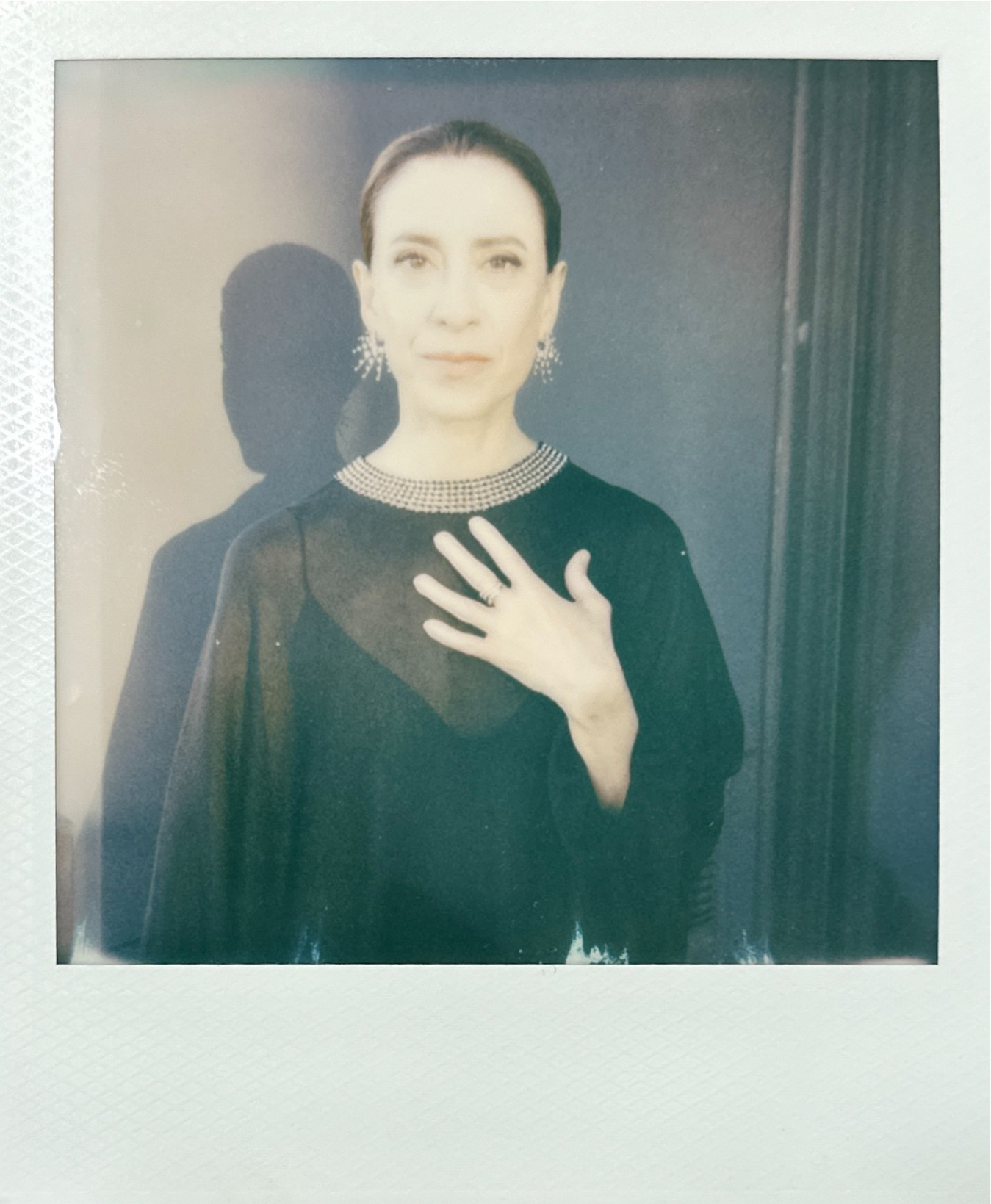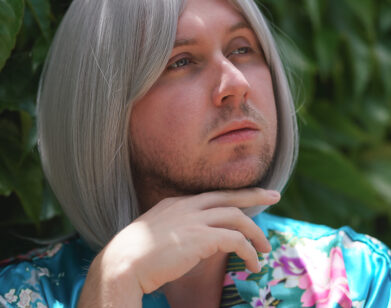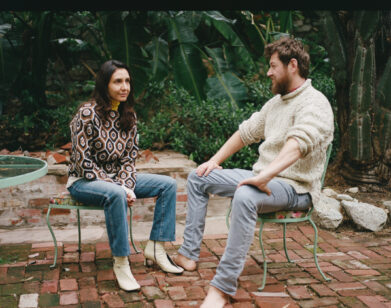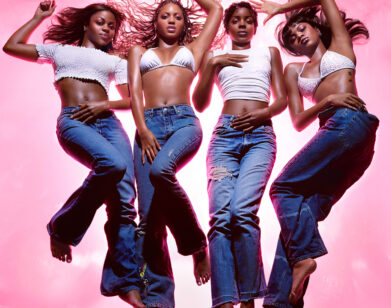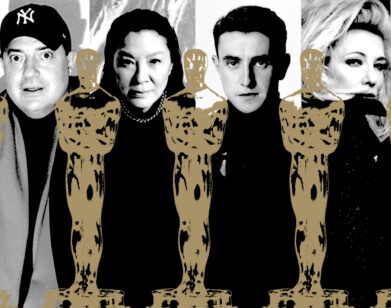ACTORS
“We Are Our Own Piano”: Fernanda Torres, in Conversation With Jessica Chastain
This awards season, the true dark horse in a topsy-turvy Best Actress race is Fernanda Torres, who delivers a fierce, demanding, and remarkably sensitive performance in director Walter Salles’ family drama I’m Still Here, based on the 2015 memoir of the same name by Marcelo Rubens Paiva. Torres, whose mother Fernanda Montenegro became the first Brazilian to be nominated for Best Actress in 1998, plays Eunice, the wife of a former Congressman who’s been abducted by right-wing activists during the military coup in Rio de Janeiro. It’s career-best work for the actor, who identified in the story some aspects of her own upbringing in a household of strong-minded artists. “My mother reminded me a lot of Eunice,” she told Jessica Chastain when the two got together on Zoom last week. “The intelligence, a kind of woman that is down-to-earth and courageous.” Chastain, an Oscar winner in 2022 for The Eyes of Tammy Faye, found herself in awe of the film’s balance of politics and interiority. “The situation your character finds herself in is large in scale,” she gushed. “Your performance, however, is so contained and held.” In conversation, the two performers got deep discussing how they’ve navigated the entertainment industry and what they’ve learned from the women they’ve portrayed on film.
———
FERNANDA TORRES: Hi.
JESSICA CHASTAIN: Hello.
TORRES: I can’t believe it. What a moment. I have so many questions for you.
CHASTAIN: You and I can talk later, too, but this is going to have to be all about you for now.
TORRES: Well, I want to know how you make it. How do you become such an independent artist in this Hollywood? This is so amazing.
CHASTAIN: Oh, thank you for saying that. But I really am just blown away by you and your career. It’s quite romantic, the idea of growing up in a household of artists.
TORRES: Yeah.
CHASTAIN: I was the black sheep in my family. You’re so gifted in terms of comedy and drama. You’re an incredible writer. And you’re now a social media sensation.
TORRES: I keep explaining to people that I didn’t do anything—the film just put me in this. There’s 4 million people following me, which is not much because in Brazil, you have people with 30 million people following them. This was because of the film, really.
CHASTAIN: Well, it’s because of the film and because of your performance, for sure. It’s an incredible performance, all the layers that you brought to her. One of my favorite moments that really made me sit up and go, “Wow,” is when you guys take the photo, and they don’t want you to smile. You laugh, and you say, “Ah, we’re going to smile”—
TORRES: But that’s the character. A lot of things that they say I did, it’s this woman.
CHASTAIN: You have to take credit for your performance.
TORRES: I will. I think I understood her, and I made a huge effort not to betray her—
CHASTAIN: Yes.
TORRES: Not to make a melodrama out of her life. I felt the burden when Walter [Salles] invited me. I said, “This is such an amazing woman that we cannot just do a soap.” And Walter was very helpful in that. He pursued realism, I think. It’s very rare to do realism because everything sounds like fiction, especially in the ’70s. Don’t you think? We end up with the ’70s hair, and suddenly, you are fake. He was a great director to not allow it to happen.
CHASTAIN: And you have a long history with him. You’ve worked with him before. Did you win your Cannes award—
TORRES: No. I won my Cannes award when I was 19 with a film that I don’t like that much.
CHASTAIN: Wow.
TORRES: I love the director and the other films that he has done, but not especially this one.
CHASTAIN: I know you’re saying you don’t like it, but you’ve always been an actress that has moved people. You were talking about realism, and how you want to avoid fakery. And it’s clear that’s always been a part of who you are. There’s a reason why you have the legacy you have, and it goes beyond your family. I know about your mother [the actress Fernanda Montenegro], and I want to get to all of that later. But first, can you talk to me about hearing about your Oscar nomination? Because I know what a big moment that is.
TORRES: It’s so strange but at the same time, so beautiful. Walter was doing films abroad, but then he came back to Brazil to do a personal story. I wanted him to like it, to do something special there. I believe so much that when you do something really local, you go universal. And I think this film with Walter, that’s the case. I was talking about my childhood. I lived in a house just like that. My mother reminded me a lot of Eunice—the intelligence, a kind of woman that is down-to-earth and courageous. It’s a form of femininity. It has so much to do with my childhood that I think it became universal because of that.
CHASTAIN: Yes. I’m always so pleased to see a female character that has so many layers to her, to really see this heroic journey that she goes through. There are many things happening at once. You look around at what’s happening in the world politically and realize, the 1970s wasn’t that long ago.
TORRES: No, and we are living a repetition of that dystopia. We’re all afraid that the world is going to die, and I remember the fear I had of the red button at that time. It was a very violent time in the world, and again now, but there is a difference, I think. Art at that time was more powerful than it is today. In Brazil, music, theater, cinema, it really had more power—
CHASTAIN: In the United States, too. If you think of the 1970s, though, that was not great for women. There was [John] Cassavetes, A Woman Under the Influence.
TORRES: It was men.
CHASTAIN: It was mostly men.
TORRES: You know what I like about the movie, too? Women, there are much more places for us to be. But at the same time, nowadays, there is also the cliché in films where men are weak. I cannot stand it. If you make the women powerful, then the men are idiots. I think that’s the problem nowadays. When I see a movie where the man is an idiot, I get pissed. It’s like, “Come on.”
CHASTAIN: The best is when they’re equal. Because that creates tension, right? If you have one person that’s always dominating and one person that’s always submitting, there’s no tension in that.
TORRES: And life is not like that.
CHASTAIN: Exactly.
TORRES: This film, what I like is that she’s a mother and a woman, but there is something special that I never did before. It’s a tragic story. It’s like Greece. Have you ever done a—
CHASTAIN: I did The Trojan Women. I played Helen of Troy.
TORRES: I had never done it.
CHASTAIN: But it’s interesting you say that, because the situation your character finds herself in is large in scale. Your performance, however, is so contained and held.
TORRES: But you know why? In tragedy, you face the unfaceable. You restrain, and you endure. That was very clear, and I never worked in anything like that, where I have restraint and change through the restraint. She was just like a sketch of what she could be, and after the disappearance of the man, she becomes herself, which is a beautiful tale.
CHASTAIN: Did you always know that you were going to be an actress?
TORRES: Yes, since I was 12 years old, I think. I started in theater. Then at the age of 30, I regretted it.
CHASTAIN: Why?
TORRES: Because I was tired of the invitation problem. You have to have someone wanting you. I said, “I don’t want to live this way. I want to do my own stuff.” And then I started to write scripts, and later books, and I understood that one thing could help the other. In a way, that’s why I find you so amazing, because I can see that you create your own things, and that’s how I was raised. My parents, they always did theater, and they were independent producers. They were choosing what they wanted to do. Of course, once in a while, a good thing happens, but you cannot rely on that because you’ll be dead.
CHASTAIN: Well, as an actor, you never want to be held at the invitation of the court. You don’t want to be the jester that’s there to—
TORRES: Exactly.
CHASTAIN: You want to actually create and not be beholden to another human, because then you lose your creativity, your expression, your understanding of what’s interesting to you. That’s fascinating, how being a writer was your way of seeking that out, of actually taking ownership of your own creativity. In some ways, it’s not for sale. It’s pure.
TORRES: It’s a great power to write. But what gave me that, I think, was theater. Theater is a human thing, but Hollywood is superhuman. You cannot control it. That’s why I find it fascinating that you were able to produce your own stuff, like the amazing Scenes Of A Marriage. You got your friend and said, “Come on, let’s do this.” And it’s a beautiful project.
CHASTAIN: Thank you.
TORRES: I think theater creates these kinds of people.
CHASTAIN: Well, with theater, it’s never finished. You always have to go back. Film is like, once you’ve got the scene, you never have to think about it again. But theater is always living in it. You’re still exploring moments. You’re not quite finished with them.
TORRES: Never. We’re polishing every day. I think that’s because the final product in theater belongs to the actor, and the final product in cinema belongs to the producer and the director. Actors, you are part of it, but you are not in control up to the end. In theater, you are. I have been doing a monologue for 20 years, and I did it because of Spalding Gray. Do you know Spalding Gray?
CHASTAIN: Yes. I actually saw Spalding Gray when I was a student in New York. He was incredible.
TORRES: I envy him. I said, “One day, I will do something at a table with a microphone.” And then, they invited me to do a whole book about the sex life of this 70-year-old woman. That process helped me. To memorize a whole book, to understand the rhythm of the paragraphs. It made me write, I think.
CHASTAIN: Are you interested in directing?
TORRES: No.
CHASTAIN: Why?
TORRES: I don’t have anything to say. I don’t know where to put the camera. I would be totally lost. But I like to direct actors. For instance, I adapted my book into a series, and I was very good on the set. I was not directing, but I like to think of a scene. I don’t care about where to put the camera, and I think I would not survive the editing.
CHASTAIN: That’s the thing. Doing the edit—
TORRES: Very depressing.
CHASTAIN: In a dark room all the time.
TORRES: It’s not just the dark rooms. You think you did something wonderful, and then when you put it there on the screen, it’s just awful. I think I would panic on the first day in the editing room.
CHASTAIN: I don’t know, Fernanda. I know you say that you wouldn’t know where to put the camera, but you speak as an all-encompassing artist.
TORRES: But I don’t think you have to be a director to be an author.
CHASTAIN: No, but you do understand relationships with actors. You just need a good DP. Then call me, and I’ll be in your film.
TORRES: Oh, please. I was just watching all your films that I hadn’t seen. What an amazing career. It’s unbelievable, because you could be just get by being beautiful.
CHASTAIN: God bless you.
TORRES: Come on.
CHASTAIN: You’re so kind to say that. I’m a bit shy, and I don’t take compliments well.
TORRES: Neither do I. But I could see that you are in charge of your life, and you are able to look for great things and make them possible. You are not just waiting for people to invite you. Because that’s death.
CHASTAIN: But you’re like that, too.
TORRES: I am, but—
CHASTAIN: You talked about when you turned 30 being like, “Okay. I don’t like this anymore.” You’re a curious human being.
TORRES: Ah, that’s the main word: curiosity. I’m a curious person.
CHASTAIN: Now, when you were playing Eunice, the obvious approach is the weepy one, right? The tragedy of it all. In your curiosity, I believe you found other ways around it. Did you guys rehearse beforehand? Did you have an idea of what you were going to do? Did you show up with a ton of research? I’d love to know your process.
TORRES: For us, we had the book. The book is like a bible. Their lives are so enormous, so I had a lot of material from the ten chapters: her childhood, how she was raised to be the perfect housewife, the relationship between her and Rubens. Then I had the interviews, and in the interviews, you could see the femininity, the persuasiveness, the intelligence, the anger, and the smile. But the first thing I did even before reading—I never did it before—I went to a coach in Brazil, who’s a very interesting woman. She did theater school in Greece, and she is also a psychologist.
CHASTAIN: Oh, that’s interesting.
TORRES: She’s the best person. So, four months with her, we worked creating memories. For instance, one day, I arrived and she said, “Today, I want you just to lay down and listen. Because she spends 11 days in a prison, and I think she spends 11 days listening.”
CHASTAIN: That’s smart.
TORRES: The things I thought during that rehearsal with her, it was all with me throughout the film. And then after each session like this, she asked me to write it down, to write a letter to my son. It was a very profound thing. So by the first reading, I had sparks of Eunice already, and then we shot chronologically. And another wonderful thing is, Walter directed it so well that you don’t think there is someone directing this movie at all. He disappeared. You don’t have—
CHASTAIN: “Look where the camera is.”
TORRES: No, you just forget it.
CHASTAIN: Was he like that on set with you?
TORRES: Totally. The first film we did, he was different. That was the film where he discovered what kind of director he was, with small groups just like the documentaries he does. He had an antenna to anything that looked like fiction, in the wardrobe, in the house, in the way we act. He wanted realism. It’s a very mature and—how do you say?—generous direction by him. If he has something to say, he says it to you in your ear. He likes to do it, because he doesn’t believe in a second shot trying to repeat the first one. So he always changes something in one actor without telling the others. He’ll create something different.
CHASTAIN: A surprise.
TORRES: A noise that nobody is expecting. But there is a difference. In Foreign Land, we were young and doing stunts together. Now, he was more grumpy when something was not the way he… I think he had so much respect for the family, because he lived in that house. He was an adolescent there, and that house introduced him to Brazil, to Tropicália, to architecture, to politics. He didn’t want to betray his own memory. When he saw something fake, you could see that it annoyed him. There is a scene when the house is being dismantled. It was our last day in that house. The house was being dismantled, and the film was being dismantled. It’s like magic, isn’t it? You don’t want that to end.
CHASTAIN: No. You get confused. The lines are blurred in terms of family. People become close to you—
TORRES: Very close. A friend of mine told me once, “I know what it means to be filming on location. You look at a boy and you say, ‘What an ugly guy.’ The second week, you’re like, ‘Oh, he’s kind of cute.’ And the third week, you fall in love madly.”
CHASTAIN: [Laughs] That’s so funny. Did you learn anything about yourself from this film? I find that when I’m working, I can get surprised by myself. I think I’m constantly questioning who I am as a person, and each project I work on, I discover something new.
TORRES: Of course. We’re actors. The characters we play teach us emotions.
CHASTAIN: You’re right. That’s so beautiful.
TORRES: You end up totally different. After playing Eunice, I’m capable to access emotions that I was not able to before in my life and as an actress. I remember my mother, with every character she made, she was different.
CHASTAIN: What a strange life we lead.
TORRES: You see? It’s strange, because we are the instruments. We are our own piano.
CHASTAIN: It’s true. Speaking of that, what do you want to do now? It’s really poetic and beautiful that you’re the second Brazilian actress nominated for an Oscar after your mother.
TORRES: After my mother, yes.
CHASTAIN: It’s incredible. I have to tell you, I’m friends with Anne Hathaway and she won an Oscar for playing a part that her mother toured in a play. There’s something so beautiful about that. Having had this experience now, what are you excited for in the future?
TORRES: If there is something I want to do now, I wrote a script for a six-chapter series that’s in Brazil. But in theater, there is this short story of Eça de Queirós, a 19th Century Portuguese writer, a genius, and it’s a Darwinist Biblical version of the Genesis. I will send it to you.
CHASTAIN: Oh, please.
TORRES: It’s unbelievable, and I have to make it. And I want to do a film after my mom, a kind of mockumentary with her saying bye. But first, I have to sleep. That’s my main project.
CHASTAIN: Well, you definitely deserve it.
TORRES: And what are you going to do now?
CHASTAIN: Oh my gosh. I don’t know. My kids take up a lot, and I’m very tired—
TORRES: Mine are grownups.
CHASTAIN: See, there you go. But I love Ibsen, and I had the opportunity to play Nora in A Doll’s House. Now I’m thinking Hebba Gabler could be quite great. I like those characters.
TORRES: I thought about it when I saw you in Miss Julie. But tell me one thing, how many movies do you do per year?
CHASTAIN: It depends. Because I didn’t start working until much later, it took a while for me to get an opportunity. It’s like what you said, waiting to be invited was very frustrating. I was trying to create my own work all the time. And then, as soon as I started working, it was like an avalanche. After The Tree of Life and stuff, there were times I would do five movies in one year.
TORRES: No!
CHASTAIN: But I was obsessive. That’s all I had.
TORRES: You didn’t have children.
CHASTAIN: Exactly, and I had been waiting for so long. Also, I studied repertory theater where you’re constantly playing mini-characters. Like, when I did Crimson Peak with Guillermo del Toro, I filmed it at the same time as I filmed J.C. Chandor’s A Most Violent Year. I would fly back and forth to the different—
TORRES: No!
CHASTAIN: I was crazy.
TORRES: But that’s the time to do it.
CHASTAIN: Now, I love prepping. I love spending time with my kids. I don’t want to shortchange them, because I know that when I work, I’m really in the shoot.
TORRES: I know exactly the feeling. I have four boys.
CHASTAIN: Four boys. You’re a hero.
TORRES: I’m a hero.
CHASTAIN: I want to send you my phone number, because I would love to sit down with you when we’re not being recorded and after we’ve both slept. I just think you’re so exceptional and so inspiring to me—
TORRES: Oh, don’t say that. I’m a huge fan.
CHASTAIN: Well, I want to be friends. Your performance is unbelievable, and I’m so happy you were included in this group of people who were recognized.
TORRES: Oh, thank you very much. Ciao.

